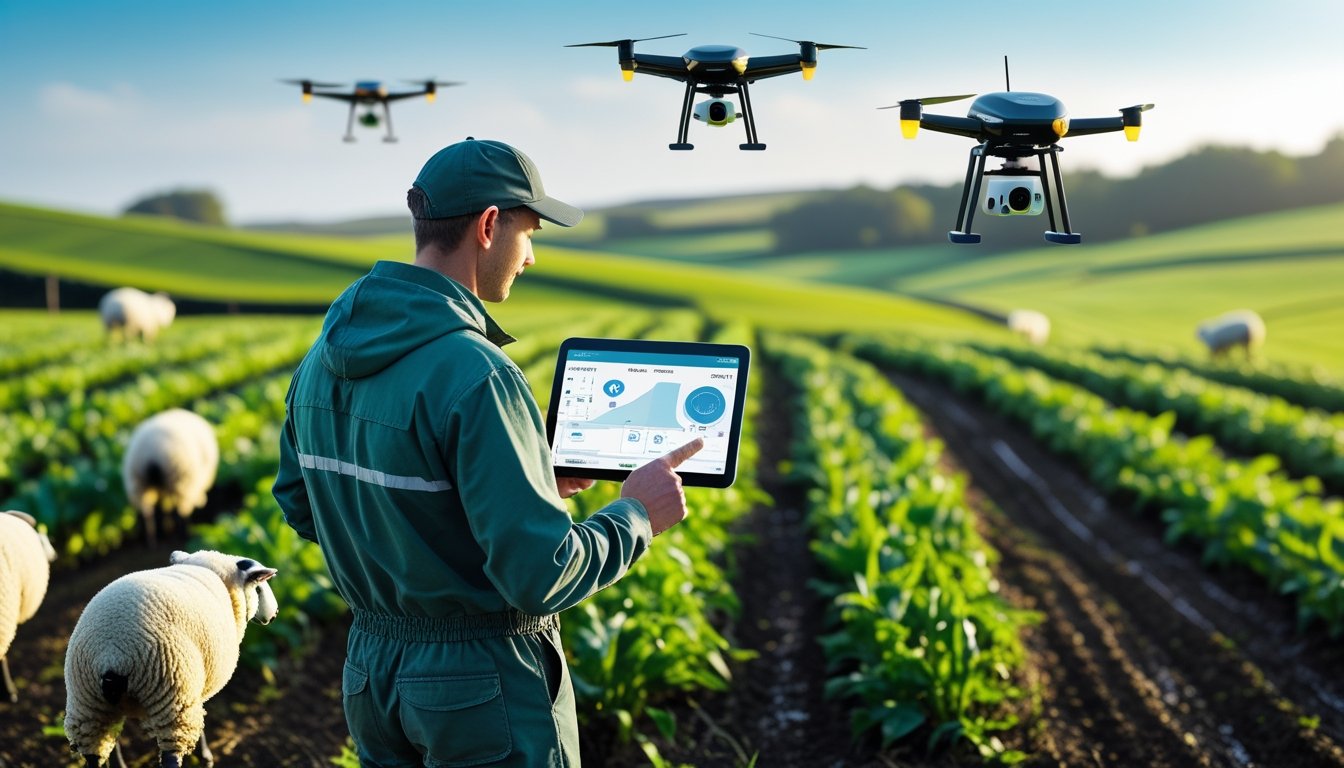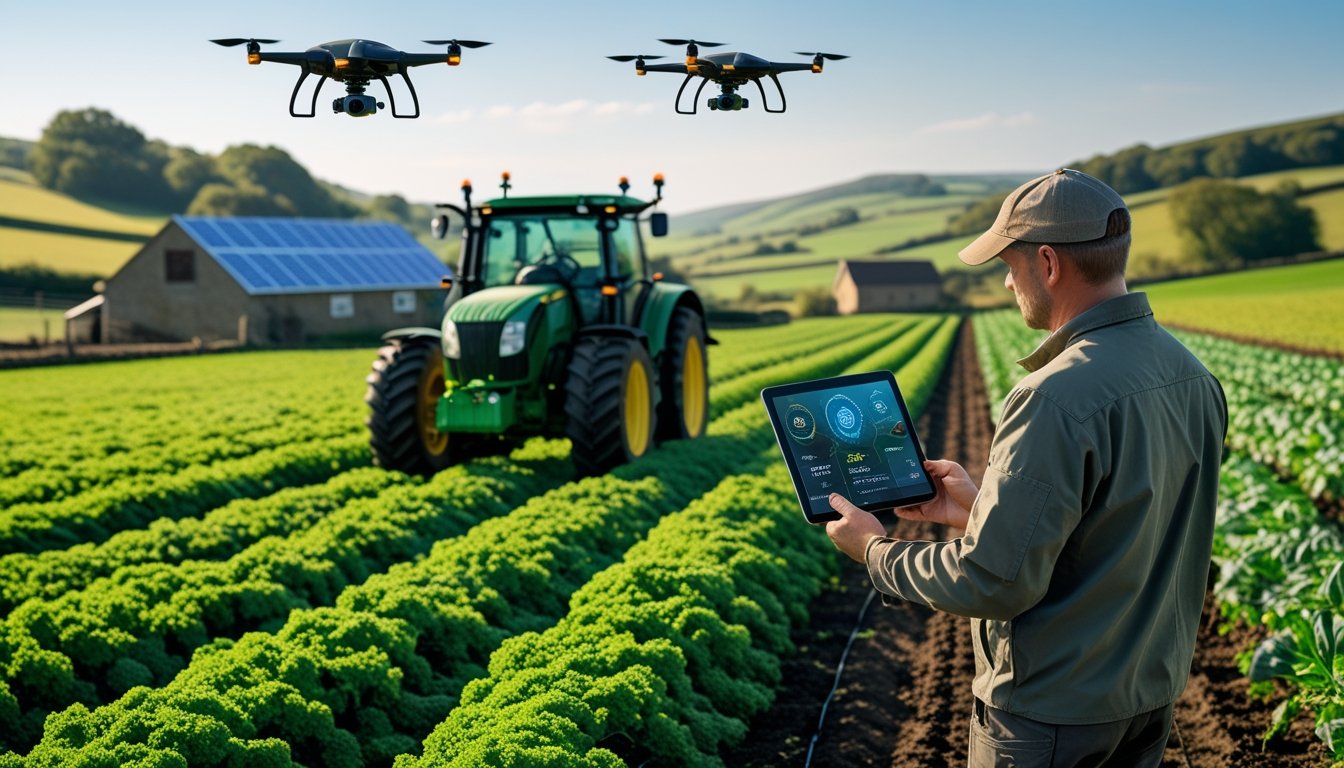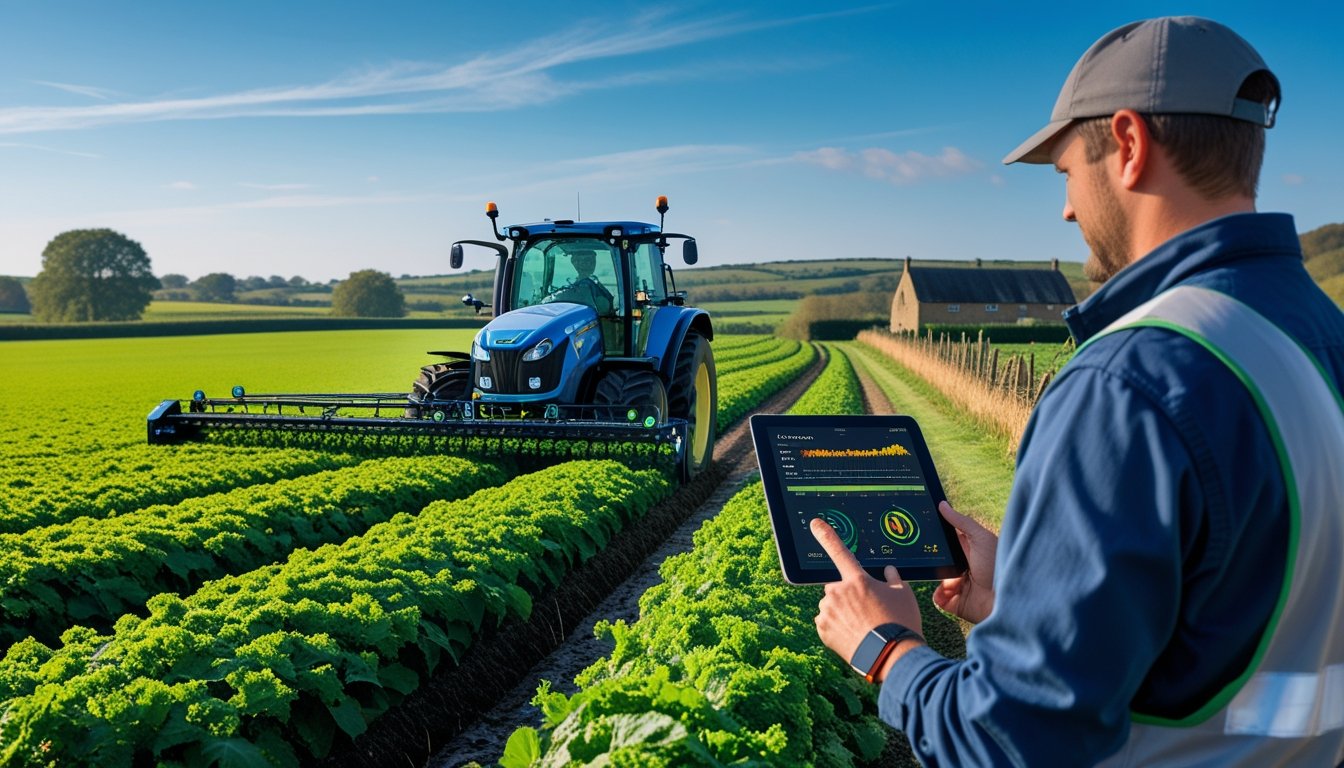Late updated: 14 Jun 2025 13:06
Written by: Oliver Bennett
How AI Is Enhancing Rural UK Farming Practices: A Modern Agricultural Revolution
Artificial Intelligence is reshaping the landscape of rural UK farming in ways that are both innovative and essential for the future. As we integrate AI into our agricultural practices, we find ourselves at the forefront of a transformation that enhances sustainability and productivity. AI not only streamlines farming processes but also tackles environmental challenges by optimising resource efficiency and reducing carbon footprints.

Our exploration of AI’s impact reveals tools such as predictive algorithms and digital twins, which offer unprecedented precision in farming. By simulating various environmental conditions, these technologies guide farmers to make informed decisions that promote healthier crops and improved yield. In a sector that faces mounting pressure to become more sustainable, AI's role is indispensable.
Moreover, the adoption of AI-driven solutions enables farmers to automate tasks and improve decision-making, leading to greater resilience against climate fluctuations. As global challenges grow more complex, our commitment to harnessing AI in farming becomes a vital component of sustaining the rural economy and environment.
Key Takeaways
- AI enhances the sustainability and productivity of rural UK farming.
- Precision tools like digital twins enable better farming decisions.
- Automated solutions increase resilience against environmental challenges.
The Transformation of Rural UK Farming Through AI
Our exploration into the transformation of rural UK farming through AI uncovers how precision farming methods, soil health monitoring, and the introduction of automation and robotics are reshaping the agricultural landscape. This has led to enhanced productivity and sustainability in ways previously thought unattainable.
Precision Agriculture and Data-Driven Techniques
Precision agriculture is revolutionising how we manage farms by using data analytics and machine learning. By harnessing real-time data from IoT devices, we can monitor crop conditions and adjust inputs like water and fertiliser more efficiently. Tools such as drone imagery and remote sensing support this adaptation by providing crucial insights into field variability. Predictive analytics inform yield prediction, optimising resources while enhancing productivity.
This technology-driven approach enables farmers to make informed decisions, reducing waste and improving land use. Embracing precision farming techniques empowers UK agriculture to face modern challenges while securing more reliable food production systems. Our adoption of data-driven methods ensures that every resource is used optimally, highlighting AI's role in transforming agriculture into a smarter, more efficient practice.
AI Applications in Soil Health Monitoring
Monitoring soil health is critical for sustainable farming, and AI technology offers groundbreaking solutions. Using machine learning algorithms, we analyse soil data to assess nutrients, moisture, and other vital parameters, leading to better crop management. AI-powered soil sensors and smart farming tools provide continuous updates, allowing us to take proactive steps to maintain soil quality.
These advancements help predict potential issues before they affect crop yields, offering a substantial advantage in managing farm sustainability. The integration of AI into soil health monitoring facilitates precision land management, ensuring long-term productivity. Our ability to gain insights into soil conditions optimises input use and supports a healthier ecosystem, vital for the future of UK agriculture.
Automation and Robotics in Agricultural Operations
Automation and robotics are reshaping our approach to agricultural tasks, making operations more efficient and reducing labour costs. Autonomous tractors and drones handle tasks like planting, spraying, and harvesting with precision, guided by real-time data analytics. This automation reduces manual labour, increasing both speed and precision in our operations.
Robotics also addresses labour shortages and enhances safety by taking over repetitive or hazardous tasks. These advancements contribute to more sustainable farming practices, as they precisely control farming inputs and reduce waste. Our embrace of automation and robotics signifies a pivotal shift in UK agriculture, driving growth and efficiencies while ensuring environmental considerations are met through smarter, technology-driven farming methods.
AI-Driven Solutions for Sustainable and Resilient Farming

AI technology is rapidly transforming rural UK farming by enhancing sustainability, optimising resource management, and improving resilience against environmental challenges. These improvements can lead to enhanced productivity, environmental conservation, and more resilient farming systems.
Enhancing Sustainability and Environmental Impact
AI-driven tools are pivotal in improving farming sustainability and reducing environmental footprints. Precision irrigation systems utilise soil moisture sensors and weather forecasts to determine optimal watering schedules. This technology conserves water resources and reduces the risk of waterlogging and nutrient runoff.
Farmers can use AI to monitor soil health and crop conditions, using data analytics to make informed decisions that enhance soil quality and biodiversity. Implementing these practices contributes to reducing greenhouse gas emissions and aligning with sustainable farming policies.
Adaptive Pest Management and Crop Protection
AI is instrumental in modernising pest management strategies. By deploying machine learning algorithms, we can predict pest infestations and identify the most effective interventions. This precision pest management minimises pesticide use, reducing potential health and environmental risks.
Drones equipped with AI sensors provide real-time data on crop health, enabling swift responses to pest threats. These technologies facilitate the protection of crops and fruits, thereby bolstering food security and enhancing business outcomes for farmers.
Climate Adaptation and Mitigating Extreme Weather Effects
Artificial Intelligence aids in adapting to climate change by enabling proactive responses to extreme weather events. Predictive models evaluate weather patterns and help farmers plan their agricultural activities efficiently. Through AI-powered climate adaptation strategies, the resilience of farming systems against adverse conditions is strengthened.
Such systems are crucial for maintaining the health of crops and maximising yield, even in challenging climatic conditions. These innovations not only secure food production but also play a role in mitigating the environmental impacts associated with climate change.
Frequently Asked Questions

AI is significantly transforming rural UK farming by increasing productivity and enabling sustainable practices. With the implementation of advanced technologies, farmers experience improved efficiency and better decision-making capabilities.
What are the main benefits of integrating AI into rural farming in the UK?
AI offers numerous advantages such as enhanced automation, increased precision, and improved crop management. By optimising resource usage, farmers can reduce waste and increase productivity while maintaining the quality of produce.
Which AI technologies are being implemented to improve crop yield and efficiency?
In rural UK farming, AI technologies such as predictive algorithms, GPS-guided machinery, and IoT sensors are being utilised. These tools offer precise farming methods that help optimise crop growth and improve yield efficiency.
How does AI contribute to sustainable farming practices in the UK countryside?
AI contributes to sustainability by enabling precision farming techniques. This includes optimising water and fertiliser use, thereby reducing environmental impact. AI helps farmers monitor and manage their practices more effectively, promoting long-term ecological balance.
What challenges do farmers face when adopting AI technologies in rural areas?
Farmers in rural areas face challenges such as high costs of technology adoption, lack of technical expertise, and limited access to digital infrastructure. These barriers can slow down the integration of advanced AI solutions in farming.
In what ways has AI helped in managing livestock on UK farms?
AI assists in livestock management through health monitoring systems and automated feeding processes. These technologies help farmers detect illness early, improve animal welfare, and optimise production processes, ensuring healthier livestock and better yields.
How is AI being used to predict and mitigate risks in rural farming operations?
AI aids in risk prediction by analysing vast amounts of data to forecast weather conditions, pest infestations, and other potential threats. By offering timely insights, AI helps farmers take proactive measures to protect their crops and maximise yield.
